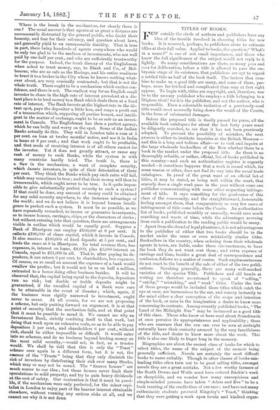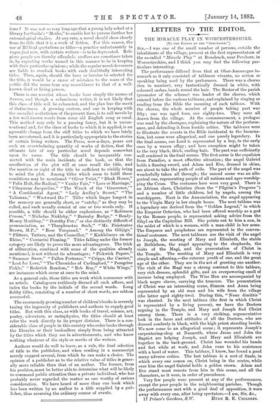TITLES OF BOOKS. F: E W outside the circle of
authors and publishers have any idea of the trouble involved in choosing titles for new books. It is reserved, perhaps, to publishers alone to estimate titles at their full value. Applied to books, the question," 'What's in a name ?" is one of not small importance, and those who know the full significance of the subject would not reply to it lightly. So many considerations are there, so many pros and cons for deliberation, before a title is allowed to pass the- em- bryonic stage of its existence, that publishers are apt to regard a settled title as half of the book itself. The factors that com- biue to make up a good title are many, and some of them, per- haps, more far-fetched and complicated than may at first sight appear. To begin with, titles are copyright, and, therefore, woe be to the unwary publisher who employs a title belonging to a litigious rival! for it is the publisher, and not the author, who is
responsible. Even a colourable imitation of a previously-used title would most assuredly bring down the wrath of the Courts, in the form of substantial damages.
Before the proposed title is finally passed for press, all the, available book catalogues for about the last forty years must be diligently searched, to see that it has not been previously adopted. To prevent the possibility of mistakes, the next process is either to institute inquiries at the British Museum— and this is a long and tedious affair—or to visit and inquire at the large wholesale booksellers of the Row whether there be a book in the market under the proposed title. As there is no thoroughly reliable, or rather, official, list of books published in this country—and such an authoritative register is urgently needed—it sometimes happens that a work is issued which, for some reason or other, does not find its way into the usual trade catalogues. In proof of the great want of an official list of titles, it may be stated, as being well within the mark, that scarcely does a single week pass in the year without some one publisher communicating with some other respecting infringe- ment of title. It says something for the good-sense of this class of the community, and the straightforward, honourable feeling amongst them, that comparatively so very few cases of infringement of title come before the Courts. Au authoritative list of books, published monthly or annually, would save much searching and waste of time, while the advantages accruing from such a publication to the reading public would be many.
• Apart from the dread of legal phantoms, it is not advantageous to the publisher of either that two books should be in the market under the same or even mistakably similar titles. Booksellers in the country, when ordering from their wholesale agents in town, are liable, under these circumstances, to have the book they do not want sent them ; and extra expense of carriage and time, besides a great deal of correspondence and confusion, follows as a matter of course. Such unpleasantnesses do not react to the benefit of the sale of either of the two publi- cations. Speaking generally, there are many well-marked varieties of the species Title. Publishers and old hands at writing are therefore accustomed to speak of " selling," " catchy," "mistaking," and " weak" titles. Under the first of these groups would be included those titles which catch the eye at once, are harmonious to the ear, and convey instantly to the mind either a clear conception of the scope and intention of the book, or raise in the imagination a desire to know more concerning its contents. Among recently published books, " The Land of the Midnight Sun" may be instanced as a good title of this class. Those who know or have read about Scandinavia at once perceive its appropriateness and applicability ; those who are unaware that the sun can ever be seen at midnight naturally have their curiosity aroused by the very fancifulness of the title, and desire to know more about the work. This title is also one likely to linger long in the memory.
Biographies are about the easiest class of books for which to select titles, the name of the subject of the memoir being generally sufficient. Novels are certainly the most difficult books to name suitably. Though in other classes of books mis- leading titles often turn out to be good selling titles, amongst novels they are a great mistake. Not a few worthy farmers of the South Downs and Wolds must have ordered Ruskin's work on sheepfolds, and we wonder how many unsuspicious and simple-minded persons have taken " Adam and Eve" to be a book treating of the cradle-time of our race ; and have not many enthusiastic students procured Kingsley's " Yeast," thinking that they were getting a work upon tondo, and kindred organ-
isms ? It was not so very long ago that a young lady asked at a library for 0 uida's "Moths," to enable her to pursue further her entomological studies. At any rate, a novel should show clearly
from its title that it is a work of fiction. For this reason, the use of Biblical quotations as titles—a practice unfortunately in
vogue just now, with certain writers—is to be deprecated. Reli- gious people are thereby offended; scoffers are sometimes taken iu, by expecting works named in this manner to be iu keeping with their particular opinions ; while the regular novel-devourers are liable to overlook books with such doubtfully interesting titles. Then, again, should the hero or heroine be selected for the title, it would be a cause of mistakes to the mass of the public did the name bear any resemblance to that of a well- known dead or living person.
There is one novelist whose books bear simply the names of flowers, and though a voluminous writer, it is not likely that this class of title will be exhausted, and the plan has the merit of distinctness. A growing custom, and one in keeping with the so-called a3stheticism of the present time, is to call novels by a few well-known words from some old English song or carol. This method may only be a passing fancy, but it is uncon- ventional and, for the class of books to which it is applied, is an agreeable change from the stiff titles to which we have lately been accustomed, and it is particularly appropriate to the stories of certain living writers. The Press, now-a-days, pours out such an overwhelming quantity of works of fiction, that the ultimate fate of any particular novel depends somewhat
upon its name. The title should be inseparably con- nected with the main incidents of the book, so that the recollection of the plot will at once recall the title, and the mention or sight of the title be sufficient to vividly bring to mind the plot. Among titles which seem to fulfil these conditions may be mentioned " Oliver Twist," " Bleak House," " Felix Holt, the Radical," " Vanity Fair," " Love or Marriage," " Citoyenne Jacqueline," " The Wreck of the Grosvenor,' " " A Confidential Agent," " Lady Audley's Secret," " The Talisman," " Westward Ho !" Titles which linger longest in the memory are generally short, or "catchy," as they may be called, and such usually consist of one or two words only. If possible, a title should be either euphonious, as "Robinson Crusoe," "Nicholas Nickleby," " Barnaby Budge," " Ready- Money Mortiboy," " Dorothy Fox ;" or else distinctly difficult of pronunciation, as " Theophrastus Such," "Mr. Pisistratns Brown, M.P.," " Rose Turquand," " Among the Gibjigs," " Flitters, Tatters, and the Councillor," " Kickleburys on the Rhine," " Contarini Fleming." Titles falling under the former category are likely to prove the more advantageous. The trick of alliteration, combined with some of the qualities already mentioned, is not without its advantages ; " Pickwick Papers," " Summer Snow," " Fallen Fortunes," " Cripps, the Carrier," " Lost for Love," "The Chronicles of Carlingford," " Peregrine Pickle," " Roderick Random," " Rob Roy," " White Wings," are instances which occur at once to the mind.
As a general rule, those titles are weak which commence with an article. Cataloguers ruthlessly discard all such affixes, and index the books by the initials of the second words. Long flabby titles, consisting of a number of short words, are seldom successful.
The enormously growing number of children's books is severely taxing the ingenuity of publishers and authors to supply good titles. But with this class, as with books of travel, science, art, poetry, adventure, or metaphysics, the titles should at least refer the work directly to its proper division. There is a con- siderable class of people in this country who order books through the libraries or their booksellers simply from being attracted by the titles which they see in advertisements, and who know nothing whatever of the style or merits of the writers.
Authors would do well to leave, as a rule, the final selection of title to the publisher, and when sending in a manuscript merely suggest several, from which he can make a choice. The opinion of a publisher as to the relative value of titles is gener- ally more reliable than that of an author. The former, from his position, must be better able to determine what will be likely to command public attention than a private individual, who has probably never regarded the matter as one worthy of serious consideration. We have heard of more than one book which has been written by an author to a title supplied by a pub- lisher, thus reversing the ordinary course of events.







































 Previous page
Previous page